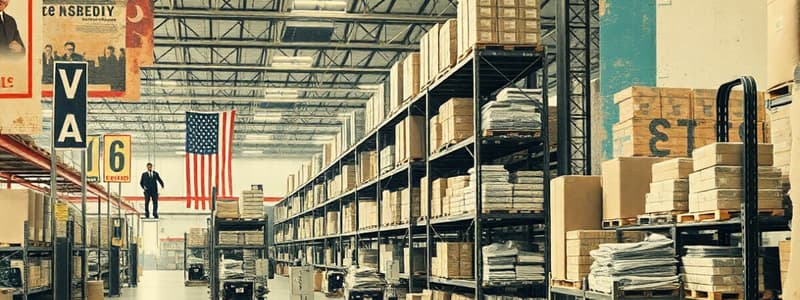Podcast
Questions and Answers
Manufacturing logistics does not concern itself with inventory management.
Manufacturing logistics does not concern itself with inventory management.
False (B)
Total quality management (TQM) applies solely to the final stages of product manufacturing.
Total quality management (TQM) applies solely to the final stages of product manufacturing.
False (B)
Efficient manufacturing logistics can lead to enhanced customer satisfaction by ensuring timely delivery of products.
Efficient manufacturing logistics can lead to enhanced customer satisfaction by ensuring timely delivery of products.
True (A)
Lean production solely focuses on reducing manufacturing costs without considering added value.
Lean production solely focuses on reducing manufacturing costs without considering added value.
Manufacturing systems logistics is influenced by the layout of the manufacturing facility.
Manufacturing systems logistics is influenced by the layout of the manufacturing facility.
Agile manufacturing emphasizes the ability to quickly respond to changing market demands.
Agile manufacturing emphasizes the ability to quickly respond to changing market demands.
The extent of product integrity is unrelated to the reliability of a product during its life expectancy.
The extent of product integrity is unrelated to the reliability of a product during its life expectancy.
Continuous improvement in agile manufacturing involves solely investing in new machinery.
Continuous improvement in agile manufacturing involves solely investing in new machinery.
Lean production requires a reduction in physical or human resources to be effective.
Lean production requires a reduction in physical or human resources to be effective.
Manufacturing costs account for approximately 30% of a product's selling price, indicating high marketability.
Manufacturing costs account for approximately 30% of a product's selling price, indicating high marketability.
Flashcards
Manufacturing Logistics
Manufacturing Logistics
Managing the flow of materials and goods within a manufacturing environment, encompassing procurement, warehousing, inventory management, transportation, and production planning.
Procurement in Manufacturing
Procurement in Manufacturing
The process of ordering and receiving raw materials needed for production.
Warehousing in Manufacturing
Warehousing in Manufacturing
Storing raw materials, work-in-progress, and finished goods efficiently within the manufacturing facility.
Total Quality Management (TQM)
Total Quality Management (TQM)
Signup and view all the flashcards
Product Integrity
Product Integrity
Signup and view all the flashcards
Lean Production
Lean Production
Signup and view all the flashcards
Agile Manufacturing
Agile Manufacturing
Signup and view all the flashcards
Value Stream Mapping
Value Stream Mapping
Signup and view all the flashcards
Continuous Improvement
Continuous Improvement
Signup and view all the flashcards
Manufacturing Cost
Manufacturing Cost
Signup and view all the flashcards
Study Notes
Manufacturing Logistics
- Manufacturing systems logistics manages and coordinates components within a manufacturing environment to optimize operations.
- Key aspects include: procurement (ordering raw materials), warehousing (storing raw materials, WIP, and finished goods), inventory management (tracking inventory levels), transportation (moving materials within and outside the facility), and production planning and scheduling (coordinating material flow with production).
Effective Manufacturing Logistics Advantages
- Reduce costs: Minimizing waste and optimizing inventory levels.
- Improve production efficiency: Ensuring materials are available when and where needed.
- Enhance customer satisfaction: Delivering products on time and in full.
- Gain a competitive advantage: Being more efficient and responsive than competitors.
Factors Impacting Manufacturing Logistics
- Type of product being manufactured.
- Production process.
- Manufacturing facility size and layout.
- Location of suppliers and customers.
- Overall business strategy.
Quality Assurance (QA) and Total Quality Management (TQM)
- QA and TQM are the responsibility of everyone involved in product design and manufacturing.
- Product integrity refers to how well a product functions during its life, if it's fit for intended use, and if it's easily maintainable.
- Defective products are costly.
Lean Production
- Lean production assesses every company activity to minimize waste and improve efficiency.
- Eliminates unnecessary operations that don't add value to the product.
- Key Focus areas:
- Efficiency and effectiveness of each manufacturing step.
- Efficiency of machinery and equipment.
- Activities of personnel in each operation.
- Aims at continual improvement of efficiency and profitability while eliminating waste.
7 Wastes of Lean Manufacturing (page 7)
- Overproduction
- Defects
- Overprocessing
- Waiting
- Transport
- Motion
- Inventory
Agile Manufacturing
- Adapts quickly to changing customer needs and market demands.
- Key aspects:
- Flexibility: Adjusting production processes to accommodate changes.
- Rapid response: Quickly ramping up production of new or modified products.
- Continuous improvement: Finding ways to improve processes.
Lean vs. Agile (Page 9)
- Comparison table outlining key distinctions in thinking, doing, planning/responding, and applicability for specific situations like repeatable operations and complex projects based on different business strategies and operations.
Manufacturing Costs
- Manufacturing costs typically account for about 40% of a product's selling price, crucial for marketability and customer satisfaction.
- Critical due to global competition and demand for high-quality products at low prices.
- Manufacturing costs components: Materials, tooling, fixed costs (energy, rent, insurance, taxes), capital (machinery, equipment, buildings, land), and labor (direct/productive labor).
Manufacturing Cost Calculations (pages 12-13)
- Formula for total manufacturing cost per unit (TMC): DMC + DLC + VMO + FMO
- Cost breakdown for developing a smartwatch, including Direct Material Cost (DMC), Direct Labor Cost (DLC), Variable Manufacturing Overhead (VMO), and Fixed Manufacturing Overhead (FMO).
Studying That Suits You
Use AI to generate personalized quizzes and flashcards to suit your learning preferences.




